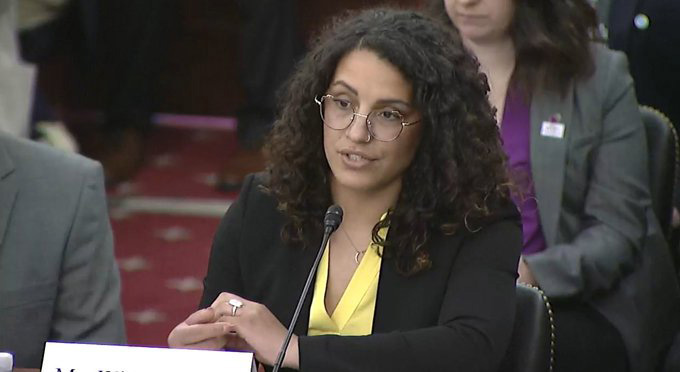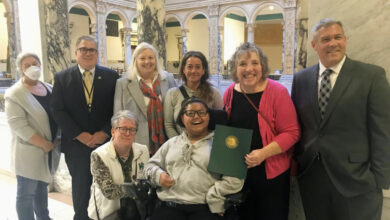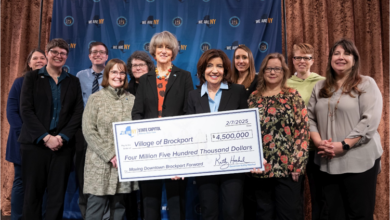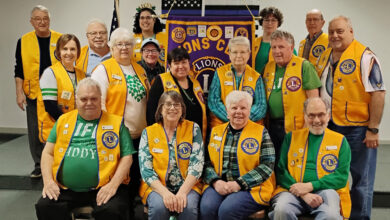WIC Outreach Specialist encourages Senate to strengthen SNAP at subcommittee hearing

Whitley Hasty, a WIC Outreach Specialist at Foodlink, in partnership with Hunger Free America, gave Senate testimony in our nation’s capital April 19 on the importance of the Supplemental Nutrition Assistance Program (SNAP).
Hasty, a Rochester mother of two, testified in front of the Senate Agriculture subcommittee on Food and Nutrition, Specialty Crops, Organics & Research after receiving an invitation from Senator John Fetterman of Pennsylvania and Senator Kirsten Gillibrand of New York. Congress is beginning to ramp up discussions surrounding the Farm Bill, a sweeping piece of legislation that is reviewed and reauthorized about every five years. Federal nutrition programs such as SNAP are included in the Farm Bill.
Hasty spent much of her testimony refuting what she called “a common SNAP myth” – and one perpetuated by another witness giving testimony at the hearing.
“Receiving benefits was never a deterrent for me to work,” Hasty said. “I continually worked or sought work while receiving SNAP, and that is true of most SNAP recipients … I’m proud of my strong work ethic and career advancement, but also know much of what I have accomplished could not have been achieved without SNAP.”
Other witnesses at the hearing included: Ty Jones Cox of the Center on Budget and Policy Priorities, Loree Jones Brown of Philabundance, Heather Reynolds of the University of Notre Dame, and James Whitford of Watered Gardens.
After the hearing, Hasty was also invited to participate in a press conference led by Gillibrand, where she promoted related legislation she has sponsored called the Closing the Meal Gap Act.
“We live in the richest nation in the world, and more than 40 million Americans still depend on food assistance. I am proud to lead my Democratic colleagues in introducing the Closing the Meal Gap Act, a bill that enhances SNAP benefits and puts food on the table for those who need it most,” Gillibrand said. “Despite this, Republicans in Congress are willing to slash federal spending for this life-saving program and play politics with people’s lives. No one in the United States should go hungry, and I will never turn my back on the more than 40 million Americans, including 15 million children, who depend on SNAP.”
Hunger Free America CEO Joel Berg also spoke about SNAP’s importance, and the power that lawmakers have to dramatically reduce food insecurity and poverty in the United States.
“Ending hunger in this country is both an economic and a moral imperative,” Berg said. “Hungry children can’t learn, hungry workers can’t work, and hungry seniors can’t remain independent. We must help the more than 30 million Americans who live in food-insecure homes by expanding SNAP benefits, ending the benefits cliff that so many low-income Americans face when they get modest raises, making it easier for people to apply for benefits online, and shattering the myth once and for all that people receiving SNAP don’t want to work. Whitley’s powerful testimony reinforced all these vital points.”
More than 40 million Americans receive SNAP benefits, including more than 100,000 residents in Monroe County. The federal government approved an increase in benefits at the outset of the pandemic, however that legislation expired in New York in March, reducing the food budgets by about $100-$200 for most households. Some Republican lawmakers have proposed further cuts to SNAP as Farm Bill negotiations continue.
Provided information





